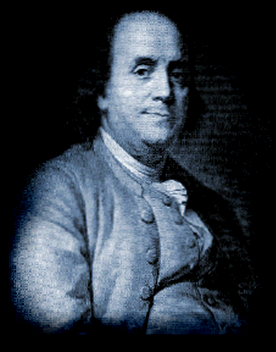
Benjamin Franklin
Biography
(1706 - 1790)
 |
Benjamin Franklin Biography (1706 - 1790) |
"The first American" as Benjamin Franklin has been called, was born in the capital of New England Puritanism, Boston, just as Puritanism was dying out. No other colonial American better embodied the promise of America than Benjamin Franklin. Through very hard work, dedication, and ingenuity, Franklin was able to rise out of poverty to become a wealthy, famous, and influential person. Although he never received a formal education after the age of ten, Franklin made important contributions in a variety of fields, including literature, journalism, science, diplomacy, education, and philosophy.
Born in Boston, Franklin was one of seventeen children. After leaving school at the age of ten, he spent the next two years working for his father then working for his older brother as a printer's apprentice. At seventeen he quit his brother and moved to Philadelphia to open his own print shop. Once he established himself as a printer, Franklin began producing a newspaper and an annual publication called Poor Richard's Almanack, which contained some of his most famous observations, aphorisms, advice and information. The Almanack was published from 1733 to 1758 and was very popular, giving Franklin the reputation of a talented writer.
In 1748, Franklin retired as a printer and began to devote himself to science and inventions. Over his lifetime, he was responsible for inventing the lightning rod, bifocals, a new type of stove, confirming the laws of electricity, and added to the store of knowledge of earthquakes and ocean and wind currents. He helped improve the city's pavements, street lighting, sanitation and started the first fire department in America as well as the first free circulating library. He also invented a rocking chair that could swat flies and a musical instrument made of moistened glass bowls that made a sound that frightened children.
He is best known in America as a statesman and a diplomat. Franklin played an important role in drafting the Declaration of Independence, getting support from France during the Revolutionary War, negotiation a peace treaty with Britian, and writing the United States Constitution and was America's first Postmaster General.
Franklin was also a brilliant writer. He perfected the Puritan plain style of "smooth, clear, and short" sentences. He was a practical man who saw no need for the frills and the fancy style of Europe. In 1771 he began his Autobiography, describing his rise from "poverty and obscurity . . . to a state of affluence and some degree of reputation in the world. . ." This book was never finished but has inspired millions of people over the centuries to aspire to what is now called the "Protestant Work Ethic" and "The American Dream." Franklin's admireres have seen him as resourceful and adaptable, a proof of the opportunities for success in America. His critics have seen him as a man who spent his life getting ahead without asking where he was going. No one can deny, however, that the "First American" lived with incredible energy and discipline and shaped the way Americans live and think today.
Back to the Class Index